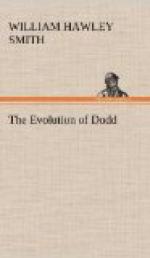It is true that classes are large, that rooms are full, that some pupils are severely dull, and that it is a very hard thing to know what it is best to do; but these things, all of them, do not excuse you from doing your best, and from making that best, in large measure, meet the absolute needs of the child. “Hic labor, hoc opus est.”
And for you, who send your six-year-olds to school with a single book, and grumble because you have to buy even so much of an outfit, what are you going to do about it when your boy drains all the life out of the little volume, in a couple of weeks or a month? He knows the stories by heart, and after that says them over, day by day, because he must, and not in the least because he cares to.
What are you going to do about this? It is largely your business. You cannot shirk it and say that you send the boy to school, and it is the teacher’s business to take care of him. That will not answer the question. Look the facts in the face, and then do as well by your boy as you do by your hogs! When they get cloyed on corn, then you change their feed, and so keep them growing, even if it does cost twice as much to make the change; and yet, the chances are that when your boy is tired to death of the old, old stories in his reader, tales worn threadbare, as they are drawled over and over in his hearing by the dullards of his class, till his soul is sick of them, even then you force him to go again and again over the hated pages, till he will resort to rank rebellion to be rid of them!
And what are you going to do about it?
Miss Stone knew none of these things. They were of little interest to her, and she bothered her head but little about them. But they were of interest to “Dodd” Weaver. In the evolution of this young hopeful they played an important part. They were hindrances to the boy at the very outset of his course in the public schools. They begot in him habits and dislikes which it took years to efface, and from which it is doubtful if he ever did fully recover. There are multitudes in like case, and what are we going to do about it?
CHAPTER V.
The severity of the duties, pastoral and paternal, that fell to the lot of Elder Weaver, wore rapidly upon the constitution of that worthy gentleman, and when “Dodd” was nine years old his father found it necessary to retire from the pulpit, for a year at least, and, as is usual in such cases, he went to that refuge for fagged out ministers of all denominations, the old homestead of his wife’s parents.
From this rustic domicile he had led the youngest daughter, a buxom bride, ten years before; to it he now returned with her and with seven small children besides. An ambitious young man and a healthy young woman, a decade before, they came back to the threshold from which they had gone out, he, broken in spirit and as poor in purse as in purpose; she, worn and faded, yet trying hard to seem cheerful as she came within the sunlight of the old home again.




